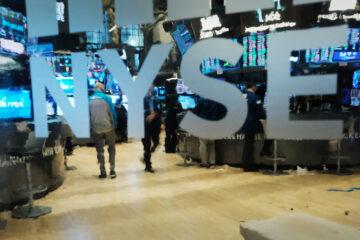Market cap is the total value of all of a company’s outstanding shares of stock.
Annie Spratt via Unsplash; Canva
What Is Market Cap?
Market capitalization—often referred to as market cap for short—is the total market value of all of a company’s outstanding shares of stock. In other words, it is the total current worth of a company as determined by the stock market.
Note: Outstanding shares include all shares issued by a company—including common stock, preferred shares, restricted shares, and those not available to the public. It does not include shares held in a company’s treasury.
Investors and analysts often use a company’s market cap to discuss its size relative to other companies, but it is only one of several popular metrics that deal with a company’s worth. Unlike other valuation metrics that calculate a company’s worth based on cash, assets, and debt, market cap is tied to share price, so it can vary significantly over a relatively short period of time due to market sentiment and investor behavior. It’s not unusual for a company’s share price (and therefore market cap) to go up or down by 5–10% in a single day.
It’s important to remember that market cap is how much a company is worth to the public as determined by its stock price. It is the total value of all of its equity—not how much the company would cost if it was sold to another company as part of a merger or acquisition.
How Is Market Capitalization Calculated?
Market capitalization is calculated by multiplying the current price of one share of a company’s stock by the number of shares outstanding to arrive at the total value of all outstanding shares.
MC = Share Price * Shares Outstanding
Market Capitalization Formula
Market Cap = Current Share Price * Number of Shares Outstanding
Market Capitalization Example: TSLA
On November 23rd, 2021, Tesla had about 1 billion shares outstanding, and at 4 p.m. ET, they were trading at $1,110. So, what was Tesla’s market cap at this point in time?
Market Cap = Current Share Price * Number of Shares Outstanding
Market Cap = $1,110 * 1 billion
Market Cap = $1.11 trillion (as of 4 p.m. ET on 11/23/21)
Small-Cap, Mid-Cap, and Large-Cap Stocks: What’s the Difference?
Generally, companies with market caps over $10 billion are considered large-cap. Many large-cap companies are household names like Coca-Cola and Johnson & Johnson. A $2 to $10 billion capitalization lands a company in the mid-cap category, and those with a cap of between $250 million and $2 billion are considered small-cap. Companies that fall below this threshold are sometimes referred to as micro-cap.
Why Is Market Capitalization Important?
Market cap is important for a number of reasons. First, the larger a company’s market cap, the higher its stock’s trading volume is likely to be. Stocks that have large market caps are easy to buy and sell because so many investors and institutions trade them daily. Stocks with smaller market caps may take longer to buy or sell.
Market cap also has a relationship with a stock’s stability. The higher a company’s market cap, the less extreme its price swings are likely to be. Large-cap companies still experience volatility, but not to the degree that small-cap companies do.
Someone trading $10 million worth of a large-cap stock would not affect the stock’s price nearly as much as someone trading $10 million worth of a small-cap stock. Large-cap stocks, therefore, tend to be less risky than smaller-cap stocks. That being said, smaller-cap stocks may have more room for growth and could potentially offer higher returns in certain cases.
Market Cap vs. Enterprise Value
Enterprise value, also known as “takeover value,” differs from market cap in that it is not determined by the market. It is a much more literal valuation metric that is arrived at by adding up a company’s assets and debt (the things that give it actual value as a business) then subtracting its cash (which could be used to pay off debt). This is the amount a company might actually be sold for to another company.
Market Cap vs. Book Value
Book value refers to the value of all of a company’s assets minus its liabilities. This is how much would theoretically be divided among shareholders if the company were to be liquidated. Book value divided by shares outstanding provides the net asset value (NAV) per share, or how much money in company assets each share of a company’s stock represents. Typically, book value is lower than market cap. In theory, the closer a company’s market cap is to its book value, the more fairly valued it is.
Frequently Asked Questions (FAQ)
Below are answers to some of the most common questions investors have about market cap that were not already covered in the sections above.
Is a High Market Cap Good?
A high market cap isn’t necessarily good or bad. A high market cap typically indicates that a company is large, well-known, and easy to trade. Companies with high market caps tend to experience less price volatility than companies with small market caps.
What Is Float-Adjusted Market Cap?
When calculating market cap, all outstanding shares are included—even those that are unlikely to change hands because they are held by governments or institutions or are otherwise restricted. When calculating float-adjusted market cap, on the other hand, only shares that are available to the public (i.e., able to be bought and sold on the open market) are included. Many popular stock indexes, including the S&P 500, include certain companies based on their float-adjusted market caps.
What Is Fully Diluted Market Cap?
Fully diluted market cap takes into account not only existing outstanding shares but also all possible outstanding shares that could result from stock options being exercised and convertible securities being converted into shares. Fully diluted market cap can be thought of as a sort of “potential” market cap given the current stock price.
How Does Market Cap Affect Stock Price?
Market cap doesn’t really affect stock price. In fact, it sort of works the other way around. Because market cap is calculated by multiplying share price by number of shares outstanding, the higher a company’s share price, the higher its market cap.
Do Cryptocurrencies Like Bitcoin Have Market Caps?
Cryptocurrencies like Ethereum and Bitcoin do have market caps, and they work the same way stocks’ market caps do. To determine the market cap of a cryptocurrency, multiply the number of existing coins by the current price or value per coin.


